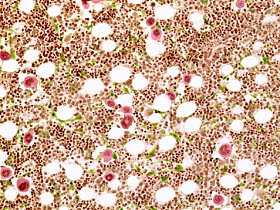 Researchers have shown that bone marrow transplantation using related HLA-haploidentical donors may be a safe and effective cure for sickle cell patients. Sickle cell disease is a heritable blood disease caused by a single nucleotide mutation and characterized by a hemoglobin variant with decreased oxygen carrying ability. Treatment options are quite limited and usually involve regular RBC transfusions. While histocompatible myeloablative allogenic bone marrow transplantations have been shown to cure some patients, HLA-matched donors are difficult to find for most patients. In addition, myeloablative conditioning may be toxic. In a study recently published in the journal Blood, Dr. Bolaños-Meade and colleagues reported that nonmyeloablative HLA-haploidentical bone marrow transplantations may be a feasible alternative. This study examined 17 individuals who had bone marrow transplants, with 14 using HLA-haploidentical donors and 3 using HLA-matched donors. At a median of 711 days of follow up, ten were asymptomatic and six no longer required immunosuppressive drugs. While none of the patients transplanted with haploidentical donors developed graft-vs-host disease, graft failure occurred in 43% of haploidentical pairs. Further studies are needed, but nonmyeloablative haploidentical transplants may be a valuable tool for patients with sickle cell disease.
Researchers have shown that bone marrow transplantation using related HLA-haploidentical donors may be a safe and effective cure for sickle cell patients. Sickle cell disease is a heritable blood disease caused by a single nucleotide mutation and characterized by a hemoglobin variant with decreased oxygen carrying ability. Treatment options are quite limited and usually involve regular RBC transfusions. While histocompatible myeloablative allogenic bone marrow transplantations have been shown to cure some patients, HLA-matched donors are difficult to find for most patients. In addition, myeloablative conditioning may be toxic. In a study recently published in the journal Blood, Dr. Bolaños-Meade and colleagues reported that nonmyeloablative HLA-haploidentical bone marrow transplantations may be a feasible alternative. This study examined 17 individuals who had bone marrow transplants, with 14 using HLA-haploidentical donors and 3 using HLA-matched donors. At a median of 711 days of follow up, ten were asymptomatic and six no longer required immunosuppressive drugs. While none of the patients transplanted with haploidentical donors developed graft-vs-host disease, graft failure occurred in 43% of haploidentical pairs. Further studies are needed, but nonmyeloablative haploidentical transplants may be a valuable tool for patients with sickle cell disease.
Reference
1. Bolaños-Meade J, Fuchs EJ, Luznik L, Lanzkron SM, Gamper CJ, Jones RJ and Brodsky RA. HLA-haploidentical bone marrow transplantation with posttransplant cyclophosphamide expands the donor pool for patients with sickle cell disease. Blood 2012;120 4285-4291.

Fine way of explaining, and good post to take data regarding my presentation focus, which i am going to deliver in institution of higher education.